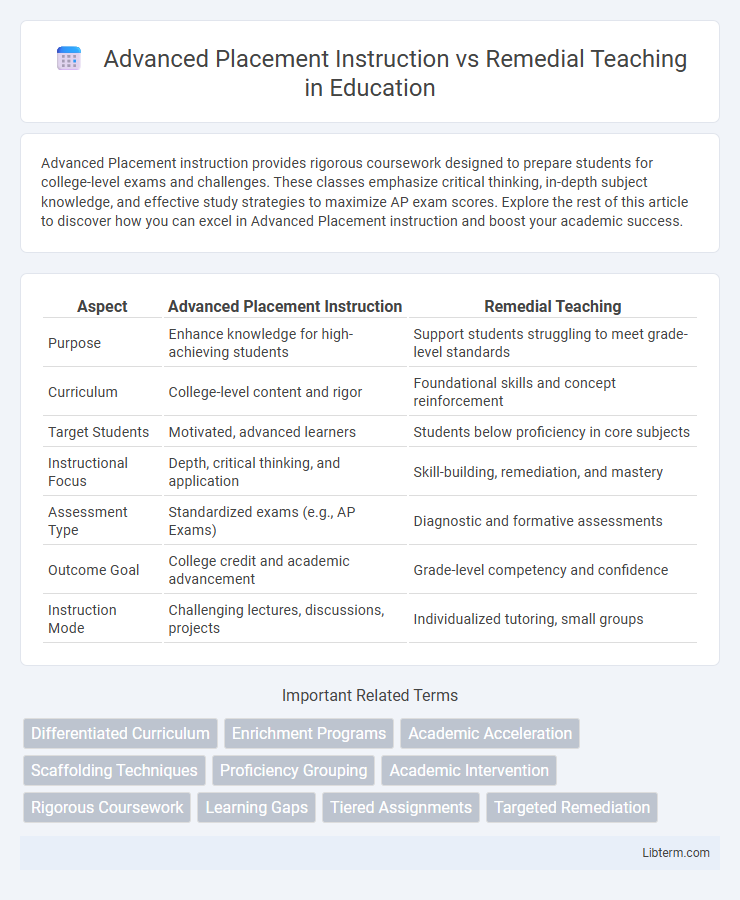Advanced Placement instruction provides rigorous coursework designed to prepare students for college-level exams and challenges. These classes emphasize critical thinking, in-depth subject knowledge, and effective study strategies to maximize AP exam scores. Explore the rest of this article to discover how you can excel in Advanced Placement instruction and boost your academic success.
Table of Comparison
| Aspect | Advanced Placement Instruction | Remedial Teaching |
|---|---|---|
| Purpose | Enhance knowledge for high-achieving students | Support students struggling to meet grade-level standards |
| Curriculum | College-level content and rigor | Foundational skills and concept reinforcement |
| Target Students | Motivated, advanced learners | Students below proficiency in core subjects |
| Instructional Focus | Depth, critical thinking, and application | Skill-building, remediation, and mastery |
| Assessment Type | Standardized exams (e.g., AP Exams) | Diagnostic and formative assessments |
| Outcome Goal | College credit and academic advancement | Grade-level competency and confidence |
| Instruction Mode | Challenging lectures, discussions, projects | Individualized tutoring, small groups |
Introduction to Advanced Placement and Remedial Teaching
Advanced Placement (AP) instruction offers rigorous, college-level curricula designed to challenge high-achieving students, enhancing critical thinking and subject mastery. Remedial teaching focuses on foundational skill development for students who struggle to meet grade-level standards, using targeted interventions to close learning gaps. Both approaches aim to optimize student outcomes by addressing diverse academic needs through tailored instructional strategies.
Defining Advanced Placement Instruction
Advanced Placement Instruction refers to specialized educational programs designed to provide high-achieving high school students with college-level coursework and rigorous academic challenges. This instruction emphasizes critical thinking, in-depth subject mastery, and preparation for Advanced Placement exams recognized by colleges nationwide. Unlike remedial teaching, which targets skill deficits and aims to bring students up to grade level, Advanced Placement Instruction accelerates learning for students ready to engage in more complex material.
Understanding Remedial Teaching Approaches
Remedial teaching approaches focus on identifying and addressing specific learning gaps by providing tailored instruction that reinforces foundational skills in reading, writing, and mathematics. These strategies often include diagnostic assessments, individualized learning plans, small group sessions, and frequent progress monitoring to ensure targeted skill development. Unlike Advanced Placement instruction, remedial teaching prioritizes mastery of core competencies to build students' confidence and academic readiness for grade-level content.
Key Objectives of AP vs Remedial Programs
Advanced Placement (AP) programs aim to challenge high-achieving students by providing rigorous, college-level curriculum designed to develop critical thinking and subject mastery. Remedial teaching focuses on helping students who struggle with fundamental skills by reinforcing basic concepts and improving academic proficiency to meet grade-level standards. The key objective of AP is academic acceleration and enrichment, whereas remedial teaching seeks skill recovery and foundational support.
Curriculum Design Differences
Advanced Placement instruction emphasizes a rigorous, college-level curriculum designed to challenge students with accelerated content depth and critical thinking skills, integrating complex concepts across subjects. Remedial teaching centers on foundational skill reinforcement, employing a scaffolded, step-by-step curriculum that addresses individual learning gaps and promotes mastery of essential knowledge. Curriculum design for AP courses focuses on enrichment and extension, while remedial programs prioritize remediation and skill-building through targeted interventions.
Pedagogical Strategies in AP and Remedial Classes
Advanced Placement instruction employs rigorous, inquiry-based pedagogical strategies that emphasize critical thinking, analytical writing, and subject mastery to prepare students for college-level challenges. In contrast, remedial teaching focuses on personalized, scaffolded approaches that address foundational skill gaps through targeted practice, formative assessments, and differentiated instruction. Both methods prioritize student engagement but diverge in complexity and objectives to optimize learning outcomes for distinct academic needs.
Student Selection and Placement Criteria
Advanced Placement instruction targets high-achieving students selected based on standardized test scores, previous academic performance, and teacher recommendations to ensure readiness for rigorous curricula. Remedial teaching typically involves placement through diagnostic assessments identifying students who need foundational skill reinforcement to meet grade-level standards. These selection and placement criteria optimize personalized learning pathways, promoting academic growth tailored to individual proficiency levels.
Impact on Academic Achievement
Advanced Placement instruction significantly elevates academic achievement by providing rigorous coursework that challenges students and promotes higher-order thinking skills. Remedial teaching aims to close learning gaps, improving foundational knowledge and boosting overall performance, particularly for struggling students. Empirical studies indicate that AP courses correlate with higher college enrollment and retention rates, while remedial instruction contributes to improved standardized test scores and grade promotion among at-risk learners.
Challenges and Limitations of Both Approaches
Advanced Placement instruction faces challenges such as high pressure on students to perform at college-level pace, limited accessibility for underrepresented groups, and the risk of superficial learning due to curriculum intensity. Remedial teaching struggles with stigma associated with extra help, resource constraints limiting personalized support, and often delayed intervention that hampers closing learning gaps effectively. Both approaches must address equity concerns and balance rigor with individual student needs to maximize academic success.
Future Perspectives in Differentiated Education
Advanced Placement instruction accelerates learning by providing rigorous, college-level content, enriching students' academic experiences and preparing them for advanced studies. Remedial teaching focuses on addressing learning gaps to build foundational skills, ensuring all students achieve grade-level proficiency. Future perspectives in differentiated education emphasize integrating adaptive technologies and personalized learning pathways to balance the needs of both advanced and remedial students, fostering inclusive and effective academic growth.
Advanced Placement Instruction Infographic

 libterm.com
libterm.com